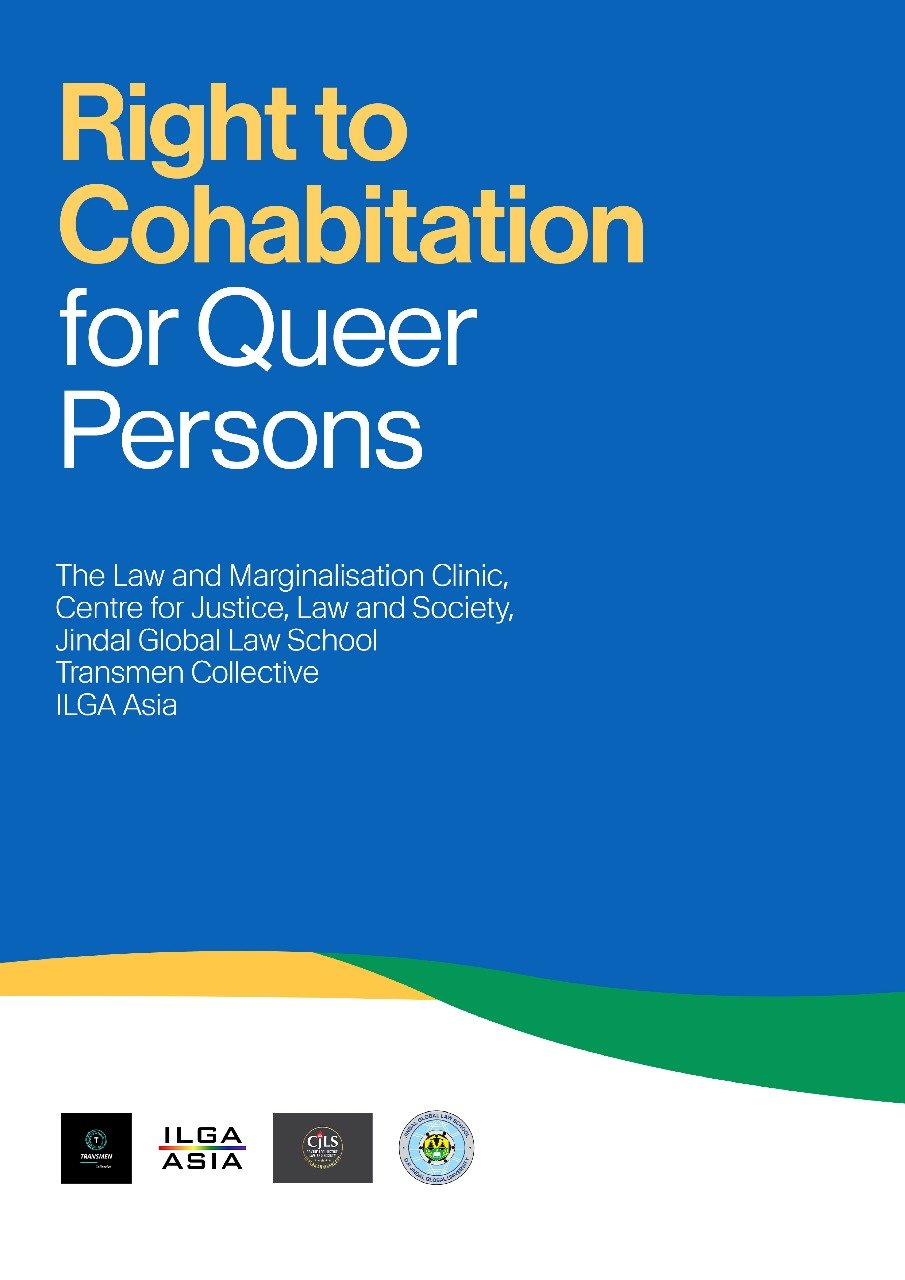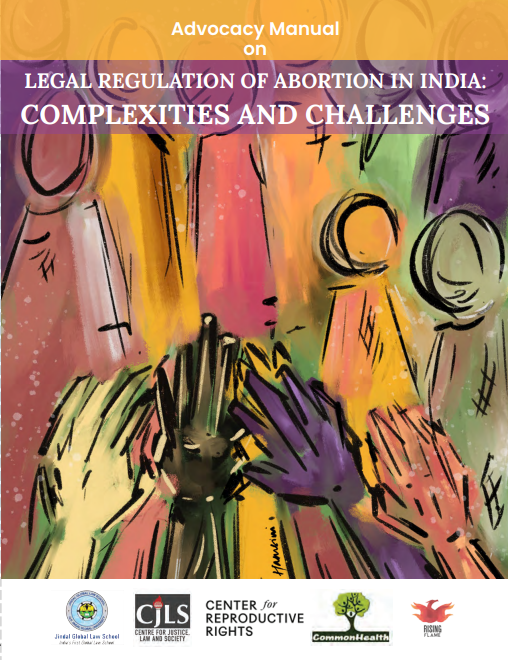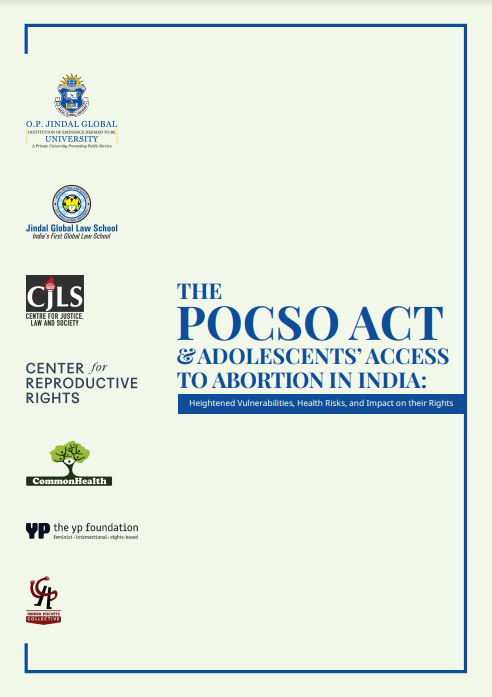Legal Awareness and Empowerment: Resources
-

Handbook on Right to Cohabitiation for Queer Persons
The Trans Justice and the Law Clinic (2023-24) collaborated with Transmen Collective and ILGA Asia to create a 'Know Your Rights' guide for queer, transgender, gender-diverse, and intersex individuals. Despite advancements in gender recognition and the decriminalization of consensual same-sex relationships, queer, transgender, and gender-diverse people still face significant legal challenges when exercising fundamental rights, such as living with a chosen partner or living free from violence.
Several Indian courts have issued notable judgments on cohabitation rights for queer individuals. This legal primer, designed for lawyers and activists, addresses key issues like the legal status of cohabitation, the recognition of diverse gender identities, and their implications in elopement cases, particularly within procedural contexts such as police stations. By exploring these issues, the publication aims to empower lawyers and activist with knowledge about cohabitation rights for queer, transgender and gender-diverse persons in India. The manual simplifies this legal framework, presenting it in an accessible format. It adopts an intersectional approach, acknowledging the diverse identities within the queer community and how various factors intersect to shape their experiences.
-

Handbook on the Rights of Transgender & Gender-Diverse Persons
Pursuant to the enactment of the Transgender Persons (Protection of Rights) Act, 2019 (the Transgender Persons Act), conversations with our friends in the movement revealed an urgent need to demystify the provisions of the Act and the rules thereunder. As a result, our clinical course has developed a comprehensive handbook on the laws and policies governing the rights of transgender and gender-diverse persons. The Handbook has been developed collaboratively through two rounds of consultation with transgender, gender diverse and intersex activists, scholars and other stakeholders dedicated to promoting trans justice in India. These consultations took place during a workshop held in September 2022 and a comprehensive national discussion in March 2023. The Handbook has greatly benefited from their insights and guidance.
-

Advocacy Manual on Legal Regulation of Abortion in India: Complexities and Challenges
This manual has been developed as a part of the “Reproductive Justice and the Law Clinic”, a course on reproductive justice and the legal barriers, offered through the Law and Marginalisation Clinic (CJLS), Jindal Global Law School in collaboration with the CRR's Asia Team, Rising Flame India and CommonHealth.
The course was proposed to fill the gap in knowledge on SRHR, from an intersectional perspective after recognising the absence of a curriculum on SRHR in India.
-

The POCSO Act & Adolescents’ Access to Abortion in India: Heightened Vulnerabilities, Health Risks, and Impact on their Rights
This factsheet aims to increase legal awareness on adolescent sexuality and abortion access and, more specifically, to explain the legal framework currently governing abortion services and adolescent sexuality in India and to demonstrate the chilling effect of this legal framework on adolescents' access to safe and legal abortion services.
-

Access to Safe and Legal Abortion: A Handbook on Abortion Laws for Healthcare Service Providers in India
Given the confusion and the lack of legal awareness surrounding the MTP Act and the PCPNDT Act, most abortion service providers are afraid of prosecution. While the legal framework on abortions is clear and the legislative intent behind both these laws is entirely separate, the conflation on the ground significantly hinders access to abortions by pregnant persons.
Therefore, CJLS, in collaboration with Ipas Development Foundation, developed “Access to Safe and Legal Abortion: A Handbook on Abortion Laws for Healthcare Service Providers in India” to increase legal awareness and, thereby, access to safe and legal abortions.
-

FAQs on the Medical Termination of Pregnancy (Amendment) Bill, 2020
This document, prepared in collaboration with BehanBox and the YP Foundation, addresses the main concerns around the Medical Termination of Pregnancy (Amendment) Bill 2020, which was introduced and passed in the Lok Sabha on March 17, 2020.
The FAQs also discuss the decriminalisation of abortion and demand the framing of the MTP Act within a rights-based framework that recognises reproductive autonomy.
-

Handbook on the Rights of Transgender and Gender Non-Conforming Persons in India
This handbook has been published by the Law and Marginalisation Clinic at CJLS (as part of the Gender, Law and Difference Clinic) in collaboration with India HIV/AIDS Alliance, Multiple Action Research Group (MARG) and International Commission of Jurists (ICJ).
The purpose of this handbook is to create a strong nexus between legal awareness and legal empowerment by enabling transgender and gender non-conforming persons to exercise their full range of rights. The handbook has also served as a training aid for legal awareness workshops.
The handbook is currently being translated into Hindi and other languages.
Research Reports
-

Access to Safe and Legal Abortion Services in Asia: Challenges and Opportunities
The is a collaborative study between the Asian Pacific Resource and Research Centre for Women (ARROW) and CJLS. This study identifies and critically examines the abortion laws and their impact on access to safe abortion rights in ten countries in South Asia and Southeast Asia i.e. Bangladesh, India, Indonesia, Malaysia, Nepal, Pakistan, the Philippines, Sri Lanka, Thailand and Vietnam. Eighty one respondents who are activists, healthcare workers, researchers and lawyers at the forefront of the abortion rights movements were interviewed for this report. The study also reveals ongoing efforts towards legal reforms in some jurisdictions and concludes with broad recommendations
-

Legal Barriers to Abortion Access During the Covid-19 Pandemic in India: One Year at a Glance
In an attempt to combat the COVID-19 pandemic, the Government of India announced a nation-wide lockdown in March 2020, which was implemented without providing adequate time and resources.
Notably, the lockdown had an unprecedented impact on people’s ability to access safe abortion services for three broad reasons: (i) the suspension of transport, (ii) lack of adequate services for non-COVID related healthcare issues, and (iii) the legal framework of abortion.
This report highlights disadvantages faced by pregnant persons, especially marginalised persons, during the COVID-19 pandemic and critically engages with the legal barriers on access to safe abortions. -

Medical Boards for Access to Abortion Untenable: Evidence from The Ground (2019-2020)
CJLS undertook a comprehensive empirical study of the district-wise availability of specialist doctors (obstetrician/gynaecologists, paediatricians, and radiologists) across states and union territories.
This study found that the setting up of functional Medical Boards is practically impossible since, (i) there is an abysmal shortage of doctors and healthcare facilities in India, and (ii) on average, states and and union territories recorded a shortfall of 80% in obstetricians and gynaecologists, and (iii) some states such as Arunachal Pradesh, Meghalaya, Mizoram and Sikkim record a shocking 100% shortfall of paediatricians.
-

Recent Legal Reforms on Gender Recognition: A Global Review
This report is the culmination of research undertaken by students in the Gender Legal Recognition Clinic by the Law and Marginalisation Clinic at Jindal Global Law School.
The report analyses the legal status of gender-variant persons in ten countries. This report highlights the range of issues confronting gender-variant persons across jurisdictions, thereby emphasising the need for flexible and multi-dimensional laws that protect the rights of marginalised communities. The report also aims to serve as an information and advocacy tool for activists, lawyers, and policy makers.
-

Abortion Laws in India: A Review of Court Cases
CJLS, in collaboration with IPAS India, undertook a research project to clarify provisions of the Medical Termination of Pregnancy Act, highlight contradictions and gaps in this Act and related laws, including the Pre-Conception Pre-Natal Diagnostic Techniques Act, 1994 and the Protection of Children from Sexual Offenses Act, 2012, and examine the implications on abortion rights of the language and legal conclusions in judgments from the Supreme Court, High Court, District Courts and Consumer Forums up to 2016.
-

India’s Human Trafficking Laws and Policies and the UN Trafficking Protocol: Achieving Clarity
This brief is the result of collaboration amongst the students and faculty of the Cornell International Human Rights Clinic, the Avon Global Center for Women and Justice at Cornell Law School, the University of Chicago Law School’s International Human Rights Clinic, and the Law and Marginalisation Clinic at CJLS.
The objective of this policy brief is to inform policy makers of the points of departure between India’s obligations under the UN Trafficking Protocol and the country’s current anti-human trafficking policies and the realities of human trafficking in India on the ground. Specifically, the policy brief aims to provide details on these points of departure and provides concluding observations on how to bring India’s policies in line with the UN Trafficking Protocol in light of information received from interviews with key stakeholders.
-

Voices From the Field: Access to Contraceptive Services and Information in the State of Haryana, India
We undertook a study on the right to contraceptive services and information for women in Haryana, India. The primary objective was to delineate whether the state of Haryana is fulfilling its obligations to provide women with access to contraceptive services and information.
The report presents findings from a multi-stakeholder analysis and human rights assessment of the various policy, social, and cultural barriers that impede women in Haryana from realising their fundamental right to contraceptive services and information. This report provides a nuanced depiction of the policy, economic, social, and cultural barriers to contraception and contributes to a deeper understanding of the state’s obligation to ensure the right to contraceptive services and information.
-

Impact of the Naz Foundation judgment on the Gay, Bisexual and Transgender people in Delhi: An Empirical Investigation
This report aims to determine and analyse the impact of the landmark judgment of the Delhi High Court in July 2009 that held that Section 377 infringed upon fundamental rights under Articles 14, 15, and 21 of the Constitution of India, and declared the section to be unconstitutional to the extent that it criminalised private consensual sexual activity between adults.
